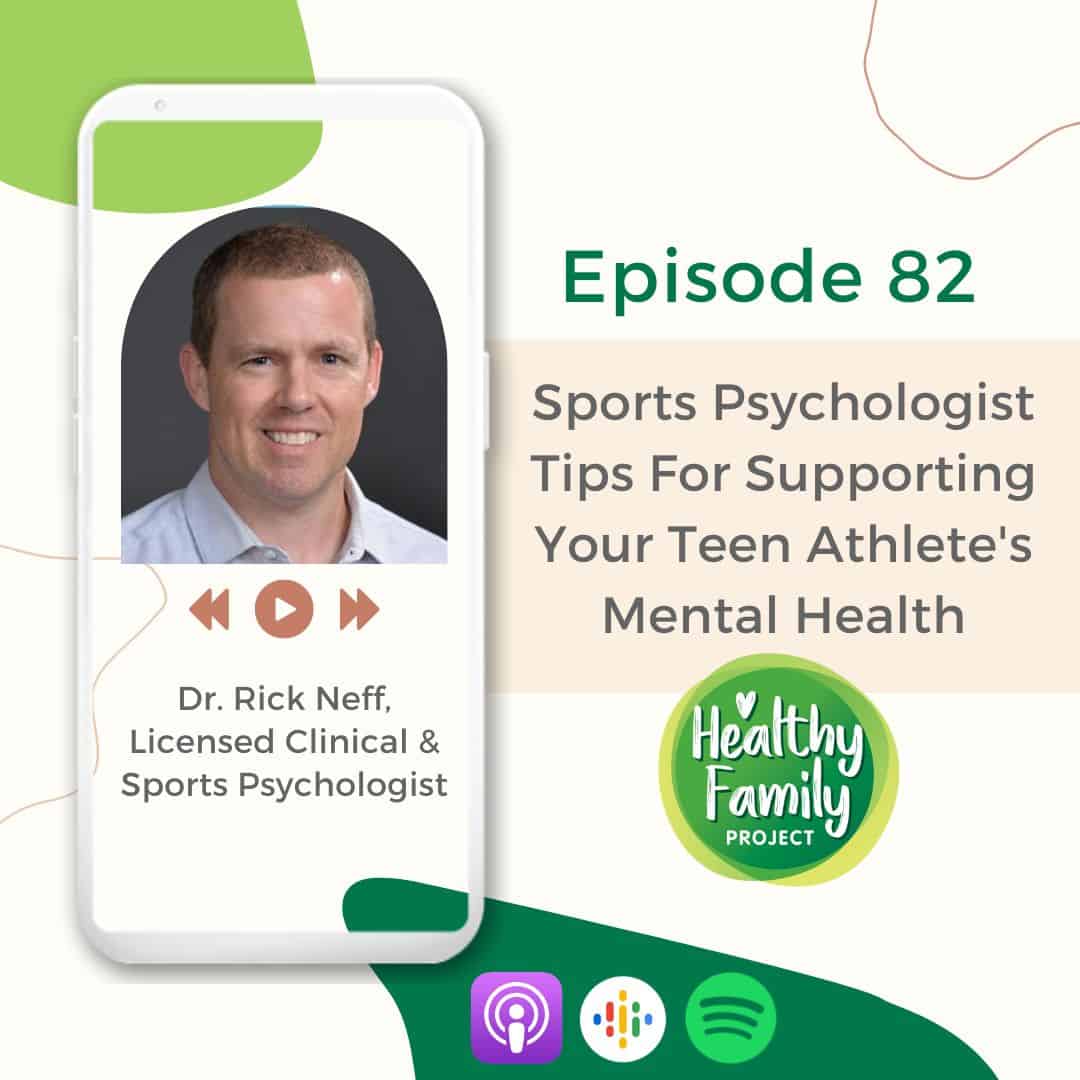Episode 82: Sports Psychologist Tips For Supporting Your Teen Athlete’s Mental Health
On this episode of the Healthy Family Project Podcast, we’re joined by Dr. Neff, a licensed clinical sports psychologist, to talk about young athletes and their mental health. While there’s a lot of fun and joy in kid and teen sports, it can also create stress and anxiety. Dr. Neff shared lots of amazing insights and tips to help us tackle mental health in a proactive way that helps kids and teens build their mental fitness and creates environments where they can feel safe working through their feelings and managing their anxiety around sports.
As a mom with a preteen and teen who have been active in sports for most of their lives, this topic is near and dear to me. I often think about how we as parents can tow the line between encouraging our kids to work hard and gain all the lessons to be gained from the dedication required in sports while also ensuring we don’t apply undue pressure that leads to added stress and anxiety.
Lots of parents in our Facebook group had questions about this topic and it was great to have an expert in sports psychology on the podcast to walk us through how we can help our active kids work on their mental fitness.
Mental fitness is just as important as physical fitness when it comes to sports. Dr. Neff reinforced the importance of being proactive versus reactive when it comes to mental health. This involves being an active listener, creating a safe space where our kids can feel comfortable talking about their feelings, helping to guide them to come up with solutions, and keeping an eye out for red flags.
While there’s so much joy in seeing our kids do well and celebrate a big win, disappointments are also inevitable and Dr. Neff helped guide us through how to navigate deterring a negative headspace after injuries or disappointments.
As parents and caregivers, we also play a big role in this. Dr. Neff covered simple ways we can be supportive and avoid our own emotional outbursts that only add to our kid’s anxiety. Something as simple as a hand gesture from across the field can help to ease anxiety in a stressful moment and help our kids to refocus.
About Our Guest, Dr. Neff
Dr. Rick Neff is a Licensed Clinical & Sports Psychologist, and the owner and founder of Inner-Edge, LLC. A former college baseball player, and standout three sport athlete in high school, he is recognized nationally and internationally as a leader in developing performance mindset. Through his extensive study and integration of clinical and sports psychology, neuroscience, and mindfulness, Dr. Neff has become known as the “Yoda” of mental skills training.
His ability to connect with players and develop trusting relationships sets him apart. Dr. Neff worked with players who have gone on to play at Duke, Oregon, Kentucky, Florida State, North Carolina, Michigan State, Texas, Georgetown, Florida, Miami, Penn State, LSU, Clemson, Temple, Indiana, Purdue, UConn, Arizona, Pitt, Syracuse, Bucknell, Colgate, Penn, Princeton, Harvard, Yale, USC, Virginia, and many more.
Listen to Sports Psychologist Tips For Supporting Your Teen Athlete’s Mental Health
What We Cover:
Want to skip straight to a hot topic? See timestamps below. But of course, we recommend listening all the way through to get all the great tips and tricks!
- 2:49 Welcome, Dr. Neff!
- 7:36 What can families do to be proactive about mental health?
- 13:06 Tactics for building mental fitness
- 19:36 Tips for transitioning to different levels of sports
- 27:06 What’s a normal level of stress? What red flags to look for?
- 34:16 How to help our kids deal with injuries
- 40:27 How to help kids accept disappointment in a healthy way
- 44:16 How can parents keep emotions under control?
Relevant Links
- Check out Dr. Neff’s website, Inner Edge
- Dr. Neff discusses the mind body connection in sports, Neck-Up Training
- Cuban Ballerina Podcast Episode
- Top Nutrition Tips for Young Athletes
- Healthy Sport Snacks for Kids
- Tips to Ease Back to School Anxiety
- Foods That Help Reduce Anxiety
Other Podcast Episodes to Check Out:
- Episode 74: Talking to Your Teen About Mental Health
- Episode 35: Helping Kids Make Good Choices
- Episode 40: Meditation Benefits for Kids
Healthy Family Project Facebook Group
Join our Healthy Family Project Facebook group! This group will serve as a safe space for parents and caregivers to talk all about raising a healthy family – from dealing with a picky eater and tips to get more fruits and veggies onto plates to exercising as a family and mental health. We welcome all of you to join in!
Listener Survey!
Thank you so much for supporting the Healthy Family Project Podcast! We’d love it if you could take 5 minutes to let us know how we can bring you the best possible content for future episodes. Take the survey here.
Healthy Family Project Podcast
Conversations covering hot topics in the world of health, food and family with a dose of fun. Helping families ease their way into a new fresh and healthy world.
Be on the lookout for new bi-weekly episodes and don’t forget to subscribe on Apple Podcasts, Google Podcasts, Spotify or your favorite podcasting site. If you like an episode, make sure to leave a rating and comment.
If you are interested in being a guest on the Healthy Family Project podcast, contact amanda@healthyfamilyproject.com with your topic idea for consideration.
Transcript for Episode 82
This transcript was produced by Otter.Ai. Please forgive any misspellings and grammatical errors.
Episode 82: Sports Psychologist Tips For Supporting Your Teen Athlete’s Mental Health
1
00:00:00,000 –> 00:00:14,320
Welcome to the Healthy Family Project Podcast covering the hot topics in the world of health,
2
00:00:14,320 –> 00:00:17,360
food, and family with a dose of fun.
3
00:00:17,360 –> 00:00:19,660
Welcome to the Healthy Family Project Podcast.
4
00:00:19,660 –> 00:00:21,340
I’m your host Amanda.
5
00:00:21,340 –> 00:00:23,880
And today we are talking with Dr. Rick Neff.
6
00:00:23,880 –> 00:00:27,440
He’s a licensed clinical and sports psychologist.
7
00:00:27,440 –> 00:00:31,320
Before we get started, I wanted to take a minute to say, oh my goodness, we are on our
8
00:00:31,320 –> 00:00:32,720
82nd episode.
9
00:00:32,720 –> 00:00:34,680
I don’t know how it’s possible.
10
00:00:34,680 –> 00:00:40,120
I feel so fortunate to have had the opportunity to speak with many talented, passionate, and
11
00:00:40,120 –> 00:00:43,800
wonderful people on these 82 episodes.
12
00:00:43,800 –> 00:00:47,680
Big thank you to all of you for making this possible.
13
00:00:47,680 –> 00:00:53,880
If we did not have people out there listening, it would be hard to continue on creating these
14
00:00:53,880 –> 00:00:54,880
episodes.
15
00:00:54,880 –> 00:00:57,320
Again, thank you for your support.
16
00:00:57,320 –> 00:01:01,240
Please continue to share the podcast with friends and family.
17
00:01:01,240 –> 00:01:03,160
Give us a rating.
18
00:01:03,160 –> 00:01:04,600
Leave a comment.
19
00:01:04,600 –> 00:01:09,420
And also be sure to join our Healthy Family Project Facebook group if you haven’t already.
20
00:01:09,420 –> 00:01:15,760
It’s a great space to share thoughts and ideas and continue conversations from the podcast.
21
00:01:15,760 –> 00:01:20,800
Many of our guests are also in the group and can answer your questions directly.
22
00:01:20,800 –> 00:01:27,280
Reminder, if you are looking for recipe inspiration, our website has nearly 600 recipes for breakfast,
23
00:01:27,280 –> 00:01:31,920
lunch, dinner, and snacks, all approved by our registered dietitian.
24
00:01:31,920 –> 00:01:36,920
And most of us out there have a student athlete or an aspiring student athlete or maybe a
25
00:01:36,920 –> 00:01:40,560
future student athlete that you don’t even know about yet.
26
00:01:40,560 –> 00:01:47,240
So this episode is very important because we often jump into a sport or have our kids
27
00:01:47,240 –> 00:01:54,000
jump into a sport without first thinking about the mental side of it and how we foster that
28
00:01:54,000 –> 00:01:55,000
mental health.
29
00:01:55,000 –> 00:02:00,760
Dr. Rick Neff is a licensed clinical and sports psychologist and the owner and founder of
30
00:02:00,760 –> 00:02:02,320
Inner Edge LLC.
31
00:02:02,320 –> 00:02:09,040
Dr. Neff also serves as the full-time sports psychologist for Villanova University, a former
32
00:02:09,040 –> 00:02:12,920
college baseball player and standout three-sport athlete in high school.
33
00:02:12,920 –> 00:02:18,620
He is recognized nationally and internationally as a leader in developing a healthy performance
34
00:02:18,620 –> 00:02:23,040
mindset as well as working with athletes through clinical concerns.
35
00:02:23,040 –> 00:02:27,360
So we had several questions come through our Facebook group and I’m excited to get those
36
00:02:27,360 –> 00:02:30,520
answered for you all today.
37
00:02:30,520 –> 00:02:31,840
Welcome to the show, Dr. Neff.
38
00:02:31,840 –> 00:02:35,320
I am thrilled to have you here and can’t wait to chat today.
39
00:02:35,320 –> 00:02:42,120
I am super excited because we did have a handful of parents in our Facebook group submit to
40
00:02:42,120 –> 00:02:43,120
us.
41
00:02:43,120 –> 00:02:45,560
So a handful of questions that we can use today.
42
00:02:45,560 –> 00:02:48,680
But before we get started, can you tell listeners a little bit about yourself?
43
00:02:48,680 –> 00:02:49,680
Sure.
44
00:02:49,680 –> 00:02:50,680
Yeah.
45
00:02:50,680 –> 00:02:51,680
Thanks for having me.
46
00:02:51,680 –> 00:03:01,760
I appreciate every opportunity to be on podcasts and be able to share about what sports psychology
47
00:03:01,760 –> 00:03:07,820
is and it’s been so stigmatized or psychology in general has been so stigmatized over the
48
00:03:07,820 –> 00:03:12,120
last hour or two years.
49
00:03:12,120 –> 00:03:15,320
A little bit about me.
50
00:03:15,320 –> 00:03:23,360
Right now I own my own private practice, Inner Edge Sports Psychology and also the full time
51
00:03:23,360 –> 00:03:27,040
sports psychologist for Villanova University.
52
00:03:27,040 –> 00:03:36,960
So my background, former three sport athlete in high school, football, basketball, baseball,
53
00:03:36,960 –> 00:03:44,080
baseball was my best sport being recruited to college.
54
00:03:44,080 –> 00:03:49,520
And unfortunately what happened to me in college and what has led me into this field of sports
55
00:03:49,520 –> 00:03:55,440
psychology was I had developed something called the YIPS and anybody who’s familiar with baseball
56
00:03:55,440 –> 00:03:58,800
or softball is familiar with that term YIPS.
57
00:03:58,800 –> 00:04:06,200
So as a pitcher, I had sort of lost my ability to throw the ball 60 feet, six inches.
58
00:04:06,200 –> 00:04:08,760
I couldn’t hit that catcher.
59
00:04:08,760 –> 00:04:19,440
And me being 43 years old and this being in the late, mid to late 90s, I didn’t receive
60
00:04:19,440 –> 00:04:26,440
and this is to nobody’s fault and I don’t blame or point fingers, but I didn’t receive
61
00:04:26,440 –> 00:04:28,560
the help that I needed.
62
00:04:28,560 –> 00:04:32,920
It turned out what was going on with me wasn’t something that was physical.
63
00:04:32,920 –> 00:04:35,480
It wasn’t an arm injury.
64
00:04:35,480 –> 00:04:43,080
I had gotten checked out medically, but it was psychological and I had learned that through
65
00:04:43,080 –> 00:04:44,880
my own studies.
66
00:04:44,880 –> 00:04:50,080
I started as a pre-med student, actually wanted to be an orthopedic surgeon.
67
00:04:50,080 –> 00:04:51,720
So I couldn’t play pro sports.
68
00:04:51,720 –> 00:04:54,640
I knew I wanted to work with athletes in that manner.
69
00:04:54,640 –> 00:04:57,800
I’ve been operated on myself several times.
70
00:04:57,800 –> 00:05:01,400
And so through some of my pre-med studies where I learned about mental health and learned
71
00:05:01,400 –> 00:05:06,960
about the mind body connection and how important it is to take care of your emotions, take
72
00:05:06,960 –> 00:05:12,680
care of your mind, just as much important as it is to take care of your body.
73
00:05:12,680 –> 00:05:18,840
Because when we think about pure performance, performance starts, it all starts in the brain.
74
00:05:18,840 –> 00:05:23,320
There’s no muscle, no memory cells throughout our biceps, triceps, quads.
75
00:05:23,320 –> 00:05:30,320
It all comes back to that thinking that we have and the coping skills that we developed
76
00:05:30,320 –> 00:05:31,320
growing up.
77
00:05:31,320 –> 00:05:39,680
So that’s what led me into the field or my degree in my doctorate in clinical psych,
78
00:05:39,680 –> 00:05:44,240
knowing that we’re all going through stuff.
79
00:05:44,240 –> 00:05:45,240
Yes.
80
00:05:45,240 –> 00:05:52,200
And each and every one of us, it’s important for me to understand on an individual level
81
00:05:52,200 –> 00:05:55,300
who I’m working with on a clinical level.
82
00:05:55,300 –> 00:06:00,880
So to be able to do the clinical work with students and athletes and student athletes,
83
00:06:00,880 –> 00:06:06,360
professional athletes, as well as doing the proactive mental training.
84
00:06:06,360 –> 00:06:12,760
So I’ve been doing this line of work for about, I guess, going on 13, 14 years now.
85
00:06:12,760 –> 00:06:17,160
And don’t look at it as a job, really look at it as a career.
86
00:06:17,160 –> 00:06:25,340
Enjoy working with, meeting new people, working with new athletes all over the world.
87
00:06:25,340 –> 00:06:26,680
So really enjoy what I do.
88
00:06:26,680 –> 00:06:29,240
And again, I really appreciate this opportunity.
89
00:06:29,240 –> 00:06:30,240
Wonderful.
90
00:06:30,240 –> 00:06:37,600
Well, it’s interesting because so many of the guests that come on the podcast have built
91
00:06:37,600 –> 00:06:47,080
their career and what they’re doing or working on today based off of some experience that
92
00:06:47,080 –> 00:06:49,920
they had and a passion that developed to help others.
93
00:06:49,920 –> 00:06:55,360
So you’re following right in line, which is totally wonderful.
94
00:06:55,360 –> 00:07:00,600
And as we mentioned before we or I mentioned before we hopped on, this is definitely a
95
00:07:00,600 –> 00:07:02,560
topic near and dear to my heart.
96
00:07:02,560 –> 00:07:09,020
Our listeners know I talk a lot about mental health, having gone through, I have two teenagers,
97
00:07:09,020 –> 00:07:13,560
so going through all the things and both are athletes.
98
00:07:13,560 –> 00:07:17,960
So definitely interested to hear what you have today.
99
00:07:17,960 –> 00:07:24,560
So with so many of us who have kids who are involved in sports at some capacity, you know,
100
00:07:24,560 –> 00:07:29,720
especially during the years that they are home with us, you know, I think athletes on
101
00:07:29,720 –> 00:07:33,560
all levels face added amount of mental strain.
102
00:07:33,560 –> 00:07:39,000
So what can families do to be proactive about mental health and mental fitness in sports
103
00:07:39,000 –> 00:07:42,080
instead of waiting until it becomes an issue?
104
00:07:42,080 –> 00:07:44,320
Yeah, great, great question.
105
00:07:44,320 –> 00:07:50,520
And very important word that you mentioned in the question is being proactive and not
106
00:07:50,520 –> 00:07:51,520
reactive.
107
00:07:51,520 –> 00:08:01,200
Anytime I give a keynote speech talk or me with the team, I always talk about it’s tough
108
00:08:01,200 –> 00:08:06,280
being coming in and being, you know, break the glass because there’s an emergency type
109
00:08:06,280 –> 00:08:08,840
of sports psychologist.
110
00:08:08,840 –> 00:08:11,600
Not that it can’t be done.
111
00:08:11,600 –> 00:08:19,760
But I think having the conversations early, you know, a child’s brain, I talk a lot about
112
00:08:19,760 –> 00:08:27,840
developmental psychology and child and adolescent psychology and child’s brain is constantly
113
00:08:27,840 –> 00:08:33,880
developing and they’re looking for social cues and they’re looking to learn and being
114
00:08:33,880 –> 00:08:37,960
able to differentiate with our children the difference between mental health and mental
115
00:08:37,960 –> 00:08:38,960
illness.
116
00:08:38,960 –> 00:08:45,120
That’s a really hot topic right now is a differentiation between mental health and mental illness.
117
00:08:45,120 –> 00:08:51,280
Just the way that our society, as I mentioned, unfortunately, has stigmatized mental health
118
00:08:51,280 –> 00:08:56,320
and mental illness and has it done, my opinion, has done a great job of separating the two.
119
00:08:56,320 –> 00:09:04,480
So I think being proactive, having normalizing conversations around emotion, talking about
120
00:09:04,480 –> 00:09:07,720
coping skills, ways to manage stress.
121
00:09:07,720 –> 00:09:16,160
I think for parents too, there’s something called the writing reflex where just as human
122
00:09:16,160 –> 00:09:22,620
beings we have, because emotions are so difficult to talk about, we have this instinct to just
123
00:09:22,620 –> 00:09:23,920
make everything right.
124
00:09:23,920 –> 00:09:24,920
It’ll be okay.
125
00:09:24,920 –> 00:09:25,920
Yes.
126
00:09:25,920 –> 00:09:26,920
Tomorrow’s another day.
127
00:09:26,920 –> 00:09:30,600
Now just leave it off.
128
00:09:30,600 –> 00:09:33,120
And you know, sounds good.
129
00:09:33,120 –> 00:09:43,160
It sounds good in the moment, but what it does is for a child and for an adolescent,
130
00:09:43,160 –> 00:09:48,640
and they may or may not consciously be aware of it, but on a more subconscious level it
131
00:09:48,640 –> 00:09:50,800
invalidates how they’re feeling.
132
00:09:50,800 –> 00:10:00,080
So creating space to talk and I always suggest when there’s something going on that is emotional
133
00:10:00,080 –> 00:10:06,680
related to sport or school or life, to open that door, to let your son, your daughter
134
00:10:06,680 –> 00:10:09,360
know that, hey, I’m here to talk.
135
00:10:09,360 –> 00:10:16,600
They may not be ready right in that moment to talk about it, but knowing, giving them
136
00:10:16,600 –> 00:10:17,600
permission.
137
00:10:17,600 –> 00:10:26,000
Permission is really big with adolescents and with younger children to be able to talk
138
00:10:26,000 –> 00:10:27,000
about it.
139
00:10:27,000 –> 00:10:36,160
And we want to be as adults active listeners and be able to reflect and help our sons or
140
00:10:36,160 –> 00:10:42,840
daughters come up with a solution on their own that we can then positively reinforce.
141
00:10:42,840 –> 00:10:46,280
And that helps us to avoid that writing reflex.
142
00:10:46,280 –> 00:10:55,120
So I know that’s a long answer, but I think being proactive and talking about it earlier
143
00:10:55,120 –> 00:11:02,400
rather than later, we want to avoid waiting for the quote unquote crisis to happen.
144
00:11:02,400 –> 00:11:07,040
I couldn’t agree more in my experience over the past couple years.
145
00:11:07,040 –> 00:11:13,360
I feel like our family is finally in a proactive space, but it’s something that you don’t,
146
00:11:13,360 –> 00:11:17,480
I mean, maybe some parents know I didn’t recognize it.
147
00:11:17,480 –> 00:11:23,640
And I grew up in a time where mental health wasn’t front and center, you know, really
148
00:11:23,640 –> 00:11:25,840
at all, wasn’t even talked about.
149
00:11:25,840 –> 00:11:28,120
It was kind of like, get over it.
150
00:11:28,120 –> 00:11:29,160
Life’s hard.
151
00:11:29,160 –> 00:11:30,160
This is hard.
152
00:11:30,160 –> 00:11:31,600
Move on.
153
00:11:31,600 –> 00:11:39,040
And so walking into that myself and now looking back over the past couple years and recognizing
154
00:11:39,040 –> 00:11:45,300
and I cannot stress how important it is to be proactive, whether it’s around sports or
155
00:11:45,300 –> 00:11:46,480
just in general.
156
00:11:46,480 –> 00:11:53,880
But when it comes to mental health to, like you said, not wait till the fire is going
157
00:11:53,880 –> 00:11:59,560
to run around and try to figure out how to put it out because you’re not going to be
158
00:11:59,560 –> 00:12:06,280
able to find the right help that you need in a time like that when being proactive and
159
00:12:06,280 –> 00:12:11,880
finding people and support systems and whether it be therapists or having these people in
160
00:12:11,880 –> 00:12:16,220
the wings kind of already in place and in there.
161
00:12:16,220 –> 00:12:19,840
So proactivity, number one.
162
00:12:19,840 –> 00:12:27,200
So are there easy tactics you recommend for building mental strength during practice?
163
00:12:27,200 –> 00:12:32,760
You know, I was trying to think like so on or off the court, rank filled, all of all
164
00:12:32,760 –> 00:12:34,320
of the sports.
165
00:12:34,320 –> 00:12:40,660
I can tell you if there’s a couple of things with my daughter, she’s a varsity tennis player.
166
00:12:40,660 –> 00:12:45,500
When I say things like, try to calm down or just breathe, you know, when she’s losing
167
00:12:45,500 –> 00:12:53,560
a tennis match, she she doesn’t isn’t real receptive to those comments.
168
00:12:53,560 –> 00:12:55,240
So yeah.
169
00:12:55,240 –> 00:13:00,680
So what can we do with these kids to build their mental strength during those times off
170
00:13:00,680 –> 00:13:01,680
the court?
171
00:13:01,680 –> 00:13:07,240
So, you know, so when they are in that space and in the heat of it, what can they do?
172
00:13:07,240 –> 00:13:13,120
Yeah, again, another another great question.
173
00:13:13,120 –> 00:13:16,680
There was a typical reaction from an adolescent.
174
00:13:16,680 –> 00:13:23,680
You know, usually, you know, mom, dad, you know, loved one is is the the target of the
175
00:13:23,680 –> 00:13:24,680
frustration.
176
00:13:24,680 –> 00:13:25,680
Yes, always.
177
00:13:25,680 –> 00:13:32,600
Because, you know, again, you know, really big on the conscious subconscious levels of
178
00:13:32,600 –> 00:13:35,680
our mind and our thinking.
179
00:13:35,680 –> 00:13:41,800
And what you know, with with children with that, I mean, with people in general, I guess,
180
00:13:41,800 –> 00:13:47,160
it’s really paying attention to like body language.
181
00:13:47,160 –> 00:13:55,720
So communication, communication and connection is important in helping to start building
182
00:13:55,720 –> 00:14:03,520
mental strength or starting with mental conditioning and seven, approximately 70 percent of communication
183
00:14:03,520 –> 00:14:05,480
comes through body language.
184
00:14:05,480 –> 00:14:10,720
So our brains are they still haven’t caught up to 2022.
185
00:14:10,720 –> 00:14:21,560
So from a primitive standpoint, our brains are looking at body language and another approximately
186
00:14:21,560 –> 00:14:26,080
25 percent is tone of voice and then five percent of the words.
187
00:14:26,080 –> 00:14:33,160
That’s why a lot of coaches, parents find frustration when they’re the words are being
188
00:14:33,160 –> 00:14:34,160
spoken.
189
00:14:34,160 –> 00:14:39,740
But with the you know, with the player, with the athlete is maybe seeing or perceiving
190
00:14:39,740 –> 00:14:44,880
from the coach, parent is the body language is coming across in a negative manner.
191
00:14:44,880 –> 00:14:51,860
So one suggestion would be really being aware of one’s body language when they’re trying
192
00:14:51,860 –> 00:14:55,840
to communicate, because we’re not going to be able to get to the words or the comprehension
193
00:14:55,840 –> 00:15:02,920
of the words if the body language and the tone is perceived as more more on the negative
194
00:15:02,920 –> 00:15:03,920
side.
195
00:15:03,920 –> 00:15:04,920
Right.
196
00:15:04,920 –> 00:15:12,280
So one thing that I suggest with parents and in working with their coaches, working with
197
00:15:12,280 –> 00:15:19,920
their athletes is so through utilization of body language is development of hand, some
198
00:15:19,920 –> 00:15:29,600
type of gesture and hand signal where the athlete already knows that an error happened,
199
00:15:29,600 –> 00:15:30,860
a mistake happened.
200
00:15:30,860 –> 00:15:38,960
So they’re frustrated and our brains don’t kind of fully emotionally mature until about
201
00:15:38,960 –> 00:15:40,760
24, 25 years old.
202
00:15:40,760 –> 00:15:47,560
So you know, an adolescent could be flooded with a lot of sort of negative emotion and
203
00:15:47,560 –> 00:15:53,280
our brains are approximately seven times more likely to go negative rather than they go
204
00:15:53,280 –> 00:15:54,280
positive.
205
00:15:54,280 –> 00:16:01,600
So coming up with a simple hand gesture of this is what I do with when I’m on the bench
206
00:16:01,600 –> 00:16:08,080
with teams, with players or sitting in the stands, is coming up with a signal and that
207
00:16:08,080 –> 00:16:10,000
signal just means something.
208
00:16:10,000 –> 00:16:12,760
It means to take a breath.
209
00:16:12,760 –> 00:16:16,520
It means to I’m really, really big on focal points.
210
00:16:16,520 –> 00:16:23,780
So to improve attention or to increase attention or concentration, we need to break it.
211
00:16:23,780 –> 00:16:29,840
So the brain can only sustain attention and concentration for so long with sort of with
212
00:16:29,840 –> 00:16:30,840
regulated emotions.
213
00:16:30,840 –> 00:16:34,240
And when our emotions are flaring, that shortens.
214
00:16:34,240 –> 00:16:41,280
So, so instance, like on a tennis court, like picking a banner or something off in the distance
215
00:16:41,280 –> 00:16:51,140
when an error happens, we hit the ball out of bounds and we feel this frustration.
216
00:16:51,140 –> 00:16:56,680
So the athletes looking to the coach, looking to the parent and the simple hand gesture,
217
00:16:56,680 –> 00:17:05,120
thumbs up, you know, just a rub of the temple or pointing at the head is a reminder for
218
00:17:05,120 –> 00:17:10,620
the athlete to take a look at the focal point to breathe.
219
00:17:10,620 –> 00:17:15,000
And there’s something called the five second rule, a lot of research around this where
220
00:17:15,000 –> 00:17:20,720
we have approximately five to 16 seconds to take control of that inner dialogue.
221
00:17:20,720 –> 00:17:25,760
So we, we say anywhere from 200 to 1200 words per minute to ourselves, we’re having that
222
00:17:25,760 –> 00:17:26,760
constant conversation.
223
00:17:26,760 –> 00:17:33,000
And when we can exert control over that, we can promote a sense of relaxation.
224
00:17:33,000 –> 00:17:41,320
So I think that’s, there’s just some sort of basic baseline skills that can be used
225
00:17:41,320 –> 00:17:44,720
to allow the athlete to feel like they’re in control.
226
00:17:44,720 –> 00:17:50,600
Now the coach, the parent is providing that reminder, but they’re not using the words.
227
00:17:50,600 –> 00:17:57,080
They’re using body language, gestures, and the brain is going to be more receptive to
228
00:17:57,080 –> 00:18:01,880
that because since emotions are high.
229
00:18:01,880 –> 00:18:02,880
That’s really good advice.
230
00:18:02,880 –> 00:18:03,880
Yes.
231
00:18:03,880 –> 00:18:10,680
I’m going to have, we’re definitely going to implement the hand signal over here.
232
00:18:10,680 –> 00:18:11,680
For sure.
233
00:18:11,680 –> 00:18:15,680
I know it’s just, we try to do the breathing.
234
00:18:15,680 –> 00:18:22,720
We tried to do the box breathing and, you know, just to take a second and she’s implemented
235
00:18:22,720 –> 00:18:29,480
some things herself, even taking, they have like, I think 30 seconds in between, you know,
236
00:18:29,480 –> 00:18:31,360
the next serve that has to happen.
237
00:18:31,360 –> 00:18:36,280
And so she’ll just take a loop back to the fence, you know, and come back around.
238
00:18:36,280 –> 00:18:40,280
So I’m definitely seeing improvement from, we’ve definitely come a long way, but those
239
00:18:40,280 –> 00:18:42,540
are really great tips.
240
00:18:42,540 –> 00:18:47,640
What advice do you have for kids transitioning to the next level of a sport?
241
00:18:47,640 –> 00:18:52,320
In our Facebook group, we had a question about transitioning from high school level to college,
242
00:18:52,320 –> 00:18:58,680
which I think would be a really big one, but I know it can even be hard transitioning from
243
00:18:58,680 –> 00:19:01,320
elementary level sports to middle school.
244
00:19:01,320 –> 00:19:08,240
I know I have a nephew and he, you know, kids hit their growth spurts at different times.
245
00:19:08,240 –> 00:19:13,560
And so he is, you know, an excellent baseball player, but I see him moving into the next
246
00:19:13,560 –> 00:19:18,360
level and went to watch a game and these kids are like giants, you know?
247
00:19:18,360 –> 00:19:24,080
So I can imagine like putting myself in his shoes, you know, how like that could be mentally
248
00:19:24,080 –> 00:19:29,920
hard, even just that little thing to go into that next level and think, oh my gosh, I was
249
00:19:29,920 –> 00:19:32,440
really good in this level.
250
00:19:32,440 –> 00:19:35,200
And now I’m in here with these adult.
251
00:19:35,200 –> 00:19:39,000
Yeah, yeah.
252
00:19:39,000 –> 00:19:42,680
And this is a really big topic with the college athletes.
253
00:19:42,680 –> 00:19:45,560
You’re making that transition.
254
00:19:45,560 –> 00:19:50,520
Anytime there’s transition, you know, whether it’s elementary to middle school, middle school
255
00:19:50,520 –> 00:19:57,920
to high school, high school to college, college into, you know, the working world or professional
256
00:19:57,920 –> 00:20:09,320
world, there’s a normal level of anxiety because there’s change and change elicits anxiety
257
00:20:09,320 –> 00:20:10,320
and nervousness.
258
00:20:10,320 –> 00:20:15,640
It elicits a questioning, am I going to fit in?
259
00:20:15,640 –> 00:20:20,040
So we get all these, you know, what if questions that pop up.
260
00:20:20,040 –> 00:20:27,840
And so again, I think being able to normalize that what you’re feeling, this anxiety that
261
00:20:27,840 –> 00:20:33,080
you’re feeling, this nervous that you’re feeling, it’s okay.
262
00:20:33,080 –> 00:20:38,920
That really goes a long way, you know, because sport is, sport becomes such a big part of
263
00:20:38,920 –> 00:20:41,000
one’s identity.
264
00:20:41,000 –> 00:20:47,560
And so making that transition, you know, in high school being one of the better, the top
265
00:20:47,560 –> 00:20:55,240
players on a team, you get to the college level and talent pretty much levels out.
266
00:20:55,240 –> 00:21:02,000
And so, you know, the doubt creeps in again, those what ifs creep in having to make all
267
00:21:02,000 –> 00:21:05,600
new friends, you know, play for different coaches.
268
00:21:05,600 –> 00:21:13,400
So everything that the athletes been accustomed to and has become comfortable with gets flipped
269
00:21:13,400 –> 00:21:15,880
upside down.
270
00:21:15,880 –> 00:21:27,080
And so, you know, being able to have that open conversation and normalize that what
271
00:21:27,080 –> 00:21:30,680
you’re feeling is okay.
272
00:21:30,680 –> 00:21:38,200
Because when that door isn’t open to talk about it, the way we were just born with these
273
00:21:38,200 –> 00:21:45,200
sort of in-brand like defense mechanisms where we just stuff and stuff and stuff and stuff.
274
00:21:45,200 –> 00:21:52,880
And that’s where I have seen more sort of clinical levels of depression or anxiety come
275
00:21:52,880 –> 00:21:53,880
about.
276
00:21:53,880 –> 00:22:03,440
Because during that transition, you know, the student athlete wasn’t, their emotions
277
00:22:03,440 –> 00:22:06,320
weren’t talked about, weren’t addressed.
278
00:22:06,320 –> 00:22:10,840
And what they continue to do is just stuff and they think, I just got to play harder.
279
00:22:10,840 –> 00:22:11,840
I got to play harder.
280
00:22:11,840 –> 00:22:12,840
I got to play harder.
281
00:22:12,840 –> 00:22:18,000
And so the brain, what that’s doing is just creating a clinical level of anxiety that
282
00:22:18,000 –> 00:22:19,640
more mistakes may happen.
283
00:22:19,640 –> 00:22:26,160
And it just becomes this negative feedback loop, you know, with the student athlete.
284
00:22:26,160 –> 00:22:32,620
So that transition is, transition is hard for anybody.
285
00:22:32,620 –> 00:22:39,960
So again, I think being able to talk about it, prepare for it, normalize it.
286
00:22:39,960 –> 00:22:45,380
If you know where your son or daughter is going to school, trying to spend as much time
287
00:22:45,380 –> 00:22:50,560
there as possible, if possible.
288
00:22:50,560 –> 00:22:55,800
Just stepping on the campus, being on the field, being on the court, being on the ring
289
00:22:55,800 –> 00:23:03,160
or being around the pool provides that sense of relaxation and calm.
290
00:23:03,160 –> 00:23:07,000
What I’ve been doing a lot more with student athletes during the transition is encouraging,
291
00:23:07,000 –> 00:23:16,360
we’re in this day and age now of group chats and all these text messaging.
292
00:23:16,360 –> 00:23:23,520
It’s reaching out to the coach, asking to be put into the team chat prior to coming
293
00:23:23,520 –> 00:23:28,840
to campus and getting to know the other teammates.
294
00:23:28,840 –> 00:23:36,320
So that is shown to be pretty helpful with that transition, rather than stepping on campus
295
00:23:36,320 –> 00:23:44,160
the first day and trying to get to know everybody and figure out your schedule and figure out
296
00:23:44,160 –> 00:23:49,840
how I got to lift at six and then practice and then class and then study hall.
297
00:23:49,840 –> 00:23:53,720
It becomes very overwhelming.
298
00:23:53,720 –> 00:24:01,320
So yeah, earlier introduction, I think is something that’s beneficial in that area.
299
00:24:01,320 –> 00:24:07,280
Well, and I think two important takeaways from what you just said is that when there
300
00:24:07,280 –> 00:24:12,840
is a transition, that is what we talked about earlier at the time to be proactive.
301
00:24:12,840 –> 00:24:21,120
So to not say, all right, we’ll see how they do with this transition, to be proactive before
302
00:24:21,120 –> 00:24:25,480
that takes place and say, listen, this could be a challenge.
303
00:24:25,480 –> 00:24:27,880
Let’s open the conversation.
304
00:24:27,880 –> 00:24:29,820
Here are some things you can do.
305
00:24:29,820 –> 00:24:37,400
And I will say, like you said about having the group chat, because I know in 2021, when
306
00:24:37,400 –> 00:24:45,620
my daughter played tennis, it was still very COVID times and they didn’t do a lot of group
307
00:24:45,620 –> 00:24:47,760
activity together.
308
00:24:47,760 –> 00:24:50,000
And they were very separate.
309
00:24:50,000 –> 00:24:55,080
And so it felt, even though they were a team, it was still a little isolated.
310
00:24:55,080 –> 00:25:00,280
And then I noticed that this year, because they were able to do more, they had a couple
311
00:25:00,280 –> 00:25:05,700
team dinners and they had a group chat going on in an app.
312
00:25:05,700 –> 00:25:09,520
And so they were able to do more as a team.
313
00:25:09,520 –> 00:25:17,400
And so I saw overall with the team, a lot of that you could sense the stress and anxiety
314
00:25:17,400 –> 00:25:23,000
was down a little bit because they had bonded more as a team and were supporting each other
315
00:25:23,000 –> 00:25:30,360
in a way that I think at that age, parents aren’t, they love their parents, I’m sure.
316
00:25:30,360 –> 00:25:35,640
But like you said, sometimes the directive of things heads our way.
317
00:25:35,640 –> 00:25:41,740
So having that team support and that connection with others is really key.
318
00:25:41,740 –> 00:25:48,160
So the sooner you can get into one of those apps or chat groups with a team as you’re
319
00:25:48,160 –> 00:25:54,840
learning, I would highly recommend that as a parent having seen the two sides of that.
320
00:25:54,840 –> 00:25:58,140
Okay, so all right, so let’s talk about that.
321
00:25:58,140 –> 00:26:01,560
This is a good transition actually to the next question.
322
00:26:01,560 –> 00:26:07,960
So what are the red flags to look for when sports is becoming too much or when the balance
323
00:26:07,960 –> 00:26:10,160
of life is off?
324
00:26:10,160 –> 00:26:17,200
So this is a tough one for me because like I said, I grew up in kind of an atmosphere,
325
00:26:17,200 –> 00:26:21,400
I guess, in a time where it was like non-existent.
326
00:26:21,400 –> 00:26:26,800
So I always felt like this is supposed to be hard, this is supposed to be tough.
327
00:26:26,800 –> 00:26:32,560
I’m supposed to be anxious because anxiety means that I’m pushing myself hard.
328
00:26:32,560 –> 00:26:40,040
So a lot of times it’s hard for me as a parent to identify like, is this normal amount of
329
00:26:40,040 –> 00:26:42,580
stress or is this kind of off?
330
00:26:42,580 –> 00:26:46,600
We had a parent of a cross country runner in our Facebook group, she was worried her
331
00:26:46,600 –> 00:26:52,120
daughter was running too much and another parent who was asking about balance in general,
332
00:26:52,120 –> 00:26:59,440
when to worry that maybe the kid is super obsessed and just going too hard in it.
333
00:26:59,440 –> 00:27:01,520
So I don’t know, what do you think?
334
00:27:01,520 –> 00:27:07,940
What’s the balance and where’s the line from healthy to unhealthy amount of stress and
335
00:27:07,940 –> 00:27:08,940
what do you think?
336
00:27:08,940 –> 00:27:15,760
Yeah, and again, another great question that comes up often in my practice.
337
00:27:15,760 –> 00:27:21,320
It’s a topic that I’ll usually will spend several sessions in an individual session
338
00:27:21,320 –> 00:27:31,080
with athletes talking about, as you said, obsession, what is a healthy obsession and
339
00:27:31,080 –> 00:27:33,360
being able to individualize it.
340
00:27:33,360 –> 00:27:39,720
Some of the red flags that I look for when I do parent workshops or coaches workshops
341
00:27:39,720 –> 00:27:47,720
to have the parents and coaches look out for are social withdrawal.
342
00:27:47,720 –> 00:28:00,640
So I think that’s a red flag, not wanting to go out and do anything other than run or
343
00:28:00,640 –> 00:28:07,960
play baseball or be on the field, hockey field.
344
00:28:07,960 –> 00:28:17,080
Your schedule is so regimented to be out there and practice and work on the skills and paying
345
00:28:17,080 –> 00:28:24,280
attention to, well, if I’m not out there and I know so and so is out there, they’re going
346
00:28:24,280 –> 00:28:28,920
to be one day or one step ahead of me and better than me.
347
00:28:28,920 –> 00:28:36,680
That’s something you hear a lot of motivational speakers talk about is being able to, you
348
00:28:36,680 –> 00:28:38,360
got to outwork your opponent.
349
00:28:38,360 –> 00:28:42,040
And yes, there’s some truth to that.
350
00:28:42,040 –> 00:28:50,960
But I think everybody’s training plan should be individualized based on who they are physically
351
00:28:50,960 –> 00:28:53,080
and psychologically.
352
00:28:53,080 –> 00:29:01,020
So when another red flag is not taking any days off, again, because of faulty thinking
353
00:29:01,020 –> 00:29:07,560
of if I take a day off, I’m going to lose my cardiovascular endurance, my VO2 max, or
354
00:29:07,560 –> 00:29:18,080
my, if I don’t take 200 swings in the cage today, I got to take 400.
355
00:29:18,080 –> 00:29:24,200
The body’s, the brain and body’s ability to remember how to play is not going to go away
356
00:29:24,200 –> 00:29:27,160
in a day, two days, three days.
357
00:29:27,160 –> 00:29:31,680
The cardiovascular endurance isn’t going to disappear in a day, two days, three days.
358
00:29:31,680 –> 00:29:40,440
So when I say social withdrawal, it’s not participating in anything else other than
359
00:29:40,440 –> 00:29:44,000
the sport or structure of the day around the sport.
360
00:29:44,000 –> 00:29:51,360
Another red flag just be like mood swings.
361
00:29:51,360 –> 00:29:59,080
The athlete is not able to participate in what they think they need to do that day.
362
00:29:59,080 –> 00:30:03,360
They’re just extremely angry and taking it out on somebody.
363
00:30:03,360 –> 00:30:08,840
Again, usually it’s a love line, somebody close to them.
364
00:30:08,840 –> 00:30:12,860
So that’s a red flag.
365
00:30:12,860 –> 00:30:20,320
Changes in eating, looking at body weight, changes in sleep patterns, not being able
366
00:30:20,320 –> 00:30:24,000
to sleep because of the anxiety of, I got to keep moving.
367
00:30:24,000 –> 00:30:25,000
I got to get up.
368
00:30:25,000 –> 00:30:29,800
I got to do, I got to be up at 5 a.m. to work out.
369
00:30:29,800 –> 00:30:38,720
So they’re really like for the major red flags that I look out for when it comes to being
370
00:30:38,720 –> 00:30:39,720
obsessed.
371
00:30:39,720 –> 00:30:49,720
It sounds like you and I, we grew up in the same era of having to focus, but there were
372
00:30:49,720 –> 00:30:52,880
for us also other hobbies.
373
00:30:52,880 –> 00:30:57,640
So I guess really I can add in a fifth one here is when there’s no other hobbies.
374
00:30:57,640 –> 00:31:04,600
For me, all the athletes I work with, there’s something that I push that, I’m going to say
375
00:31:04,600 –> 00:31:09,560
push, I guess it’s the wrong word, but really encourage and ask the athlete to do.
376
00:31:09,560 –> 00:31:15,160
I had a relationship used to the idea of video games, but even if it’s video games and I’m
377
00:31:15,160 –> 00:31:19,200
not on an obsessive level of playing to three in the morning.
378
00:31:19,200 –> 00:31:26,400
But what I found a lot of success in my practice is steering the athletes I work with towards
379
00:31:26,400 –> 00:31:30,080
some of the books that I have read.
380
00:31:30,080 –> 00:31:36,120
So in a sense, there’s still training because we can train without actually being on the
381
00:31:36,120 –> 00:31:37,120
field.
382
00:31:37,120 –> 00:31:41,600
I mean, we could spend a whole hour talking about the power of visualization and what
383
00:31:41,600 –> 00:31:43,280
it does to the body.
384
00:31:43,280 –> 00:31:52,540
So that’s another way to sort of create a healthy obsession with becoming the best version
385
00:31:52,540 –> 00:31:54,160
of oneself.
386
00:31:54,160 –> 00:32:08,460
So making sure if everything is just about sport, then to me, it’s a red flag that needs
387
00:32:08,460 –> 00:32:10,640
to be addressed and talked about.
388
00:32:10,640 –> 00:32:14,360
And it’s a difficult conversation because of messaging.
389
00:32:14,360 –> 00:32:19,360
I think social media has had a big influence in this area because everybody puts their
390
00:32:19,360 –> 00:32:24,480
best life on Instagram and Snapchat and Twitter and Facebook.
391
00:32:24,480 –> 00:32:32,440
And so what I hear often from athletes is, well, I see so and so they’re always out there.
392
00:32:32,440 –> 00:32:33,440
They look so happy.
393
00:32:33,440 –> 00:32:34,440
Everything’s going so well.
394
00:32:34,440 –> 00:32:36,440
And trying to have that conversation.
395
00:32:36,440 –> 00:32:45,680
Well, of course, they’re going to put that they won their tennis match.
396
00:32:45,680 –> 00:32:48,160
Their practice was great and training was great.
397
00:32:48,160 –> 00:32:55,800
They’re not going to really put on their sort of the more of the lows or some of the emotional
398
00:32:55,800 –> 00:32:57,360
hurdles that they ran into.
399
00:32:57,360 –> 00:33:05,440
So having to separate out the influences of social media, I think has become really a
400
00:33:05,440 –> 00:33:07,240
big part of my practice too.
401
00:33:07,240 –> 00:33:10,640
Yeah, that is an added level.
402
00:33:10,640 –> 00:33:14,640
Something else that we didn’t have in our time, I will say.
403
00:33:14,640 –> 00:33:19,160
And even as a parent, and we’ll have this question a little bit later, but even as a
404
00:33:19,160 –> 00:33:29,280
parent, something social media is challenging because you do have to remind yourself that
405
00:33:29,280 –> 00:33:32,120
they’re putting these are the happy times.
406
00:33:32,120 –> 00:33:36,960
These are the best things that they’re putting out there.
407
00:33:36,960 –> 00:33:39,960
So just social media is tough.
408
00:33:39,960 –> 00:33:41,720
So all right, we’re going to move on.
409
00:33:41,720 –> 00:33:45,280
What about injuries and missing out while recovering?
410
00:33:45,280 –> 00:33:46,720
It happens all the time.
411
00:33:46,720 –> 00:33:52,280
Someone in our group mentioned this, which I hadn’t even thought about, but I can imagine
412
00:33:52,280 –> 00:33:57,320
this could cause a huge mental strain on a kid, especially when they’re so used to that
413
00:33:57,320 –> 00:33:59,240
practice every day.
414
00:33:59,240 –> 00:34:02,040
And our schedule shift and your body’s not moving.
415
00:34:02,040 –> 00:34:08,080
I know myself and our listeners know I’ve battled with anxiety over the years.
416
00:34:08,080 –> 00:34:13,040
And when I can’t get out and move, when I can’t go to the tennis court or go to a dance
417
00:34:13,040 –> 00:34:20,560
class or go to yoga, it takes a huge toll on myself mentally, just me and not even being
418
00:34:20,560 –> 00:34:23,240
an athlete, so to speak.
419
00:34:23,240 –> 00:34:31,560
Yeah, again, it circles back to the identity, that sense of self where a part of you has
420
00:34:31,560 –> 00:34:39,620
now been taken away, that being on the field, being on the court, in the pool.
421
00:34:39,620 –> 00:34:52,240
So one thing I often suggest is even though the player is injured, to still be around
422
00:34:52,240 –> 00:34:55,160
the team as much as possible.
423
00:34:55,160 –> 00:35:03,720
Because often we’ll hear, I just can’t be around the team because it’s going to remind
424
00:35:03,720 –> 00:35:06,280
me of how much I can play.
425
00:35:06,280 –> 00:35:14,120
Coming back to the sense of connection, being around teammates who more than likely are
426
00:35:14,120 –> 00:35:17,640
going to be supportive and coaches are going to be supportive.
427
00:35:17,640 –> 00:35:25,400
I strongly encourage still trying to be around the sport, around the team as much as possible.
428
00:35:25,400 –> 00:35:33,160
I mean, there’s a professional basketball player that I still work with and he got injured
429
00:35:33,160 –> 00:35:36,280
in college towards me.
430
00:35:36,280 –> 00:35:44,120
And my suggestion to the trainer on the team was to take the training table out onto the
431
00:35:44,120 –> 00:35:50,880
court and do the physical therapy out on the court so the player can continue to be around
432
00:35:50,880 –> 00:35:53,680
the team and watch the drills and see the drills.
433
00:35:53,680 –> 00:36:00,680
Now it’s a conversation of being able to manage the emotion because yes, athletes are going
434
00:36:00,680 –> 00:36:09,240
to go through the grieving process of denial and anger and bargaining of trying to get
435
00:36:09,240 –> 00:36:14,080
back sooner, feeling depressed.
436
00:36:14,080 –> 00:36:20,920
So being able to work through those emotions, but for the injured athlete, trying to keep
437
00:36:20,920 –> 00:36:25,000
them connected as much as possible to the sport, I think it’s important.
438
00:36:25,000 –> 00:36:30,800
And that’s also an opportunity for me to talk about the use of visualization because that
439
00:36:30,800 –> 00:36:33,760
still keeps a lot of research around it.
440
00:36:33,760 –> 00:36:38,040
It still keeps the performance pathways firing.
441
00:36:38,040 –> 00:36:45,920
So there’s a little bit less of a sense of loss and often what I hear is, will I ever
442
00:36:45,920 –> 00:36:50,960
get back and be the same player after being injured?
443
00:36:50,960 –> 00:37:00,240
And what visualization has been shown to do is to actually strengthen one’s ability to
444
00:37:00,240 –> 00:37:06,560
come back and be just as good, if not better, because you’re continuing to keep all those
445
00:37:06,560 –> 00:37:08,640
neuronal pathways firing.
446
00:37:08,640 –> 00:37:09,640
Right.
447
00:37:09,640 –> 00:37:12,040
That’s excellent advice.
448
00:37:12,040 –> 00:37:18,720
I think that keeping up and being part of your team, like I said, it’s just not isolating
449
00:37:18,720 –> 00:37:19,720
yourself.
450
00:37:19,720 –> 00:37:25,600
And then that visualization, I have actually listened to a podcast, which not to get too
451
00:37:25,600 –> 00:37:27,960
far off track.
452
00:37:27,960 –> 00:37:32,080
With my younger daughter, she dances a lot.
453
00:37:32,080 –> 00:37:38,680
And it was actually about a ballerina who was unable to dance for almost an entire year,
454
00:37:38,680 –> 00:37:47,800
but she used visualizations and hand motions for an entire year and was able to learn the
455
00:37:47,800 –> 00:37:55,600
entire choreography of Swan Lake or something and dance the lead role in the show just from
456
00:37:55,600 –> 00:38:01,320
coming off of an injury, which it was crazy to have been out for that whole year.
457
00:38:01,320 –> 00:38:07,620
And then just use visualization and be able to then go in and dance the lead role because
458
00:38:07,620 –> 00:38:08,620
of that.
459
00:38:08,620 –> 00:38:10,520
It was just mind blowing.
460
00:38:10,520 –> 00:38:14,440
We listened to it several months ago and I keep bringing it up and keep thinking about
461
00:38:14,440 –> 00:38:18,560
it because it was so mind blowing of a story.
462
00:38:18,560 –> 00:38:19,560
Yeah.
463
00:38:19,560 –> 00:38:23,200
Visualized a lot of research around visualization.
464
00:38:23,200 –> 00:38:28,680
And that’s a perfect example of what you shared.
465
00:38:28,680 –> 00:38:30,400
The brain is amazing.
466
00:38:30,400 –> 00:38:31,920
I love studying the brain.
467
00:38:31,920 –> 00:38:39,800
Again, it’s been a while we’re talking about the biochemistry of the brain and the body
468
00:38:39,800 –> 00:38:41,080
when it comes to performance.
469
00:38:41,080 –> 00:38:45,840
But again, it just keeps those performance pathways strong and firing.
470
00:38:45,840 –> 00:38:51,240
And then subconsciously, when we step back out onto the court, onto the field, and the
471
00:38:51,240 –> 00:39:00,240
pool, on the stage, we can just rely on instinct and intuition and trusting oneself that I
472
00:39:00,240 –> 00:39:01,240
did train.
473
00:39:01,240 –> 00:39:06,480
Always look at visualization as a form of training.
474
00:39:06,480 –> 00:39:09,040
And then boom, there you go.
475
00:39:09,040 –> 00:39:10,040
Things just kind of happen.
476
00:39:10,040 –> 00:39:12,040
So it’s a great example.
477
00:39:12,040 –> 00:39:14,000
Yeah, I’ll have to share that with you.
478
00:39:14,000 –> 00:39:18,680
I’ll have to send you the link to it because it was totally fascinating.
479
00:39:18,680 –> 00:39:20,080
I think you would enjoy it.
480
00:39:20,080 –> 00:39:21,840
Well, I know we’re running short on time.
481
00:39:21,840 –> 00:39:23,080
I have two more questions.
482
00:39:23,080 –> 00:39:24,080
So let me see.
483
00:39:24,080 –> 00:39:27,360
I don’t want to leave any of these out because they came from the group, but let me see if
484
00:39:27,360 –> 00:39:29,460
we can get through two of these.
485
00:39:29,460 –> 00:39:35,400
So one, let’s flip the script a little and ask about how to deal with the disappointment
486
00:39:35,400 –> 00:39:42,000
of not making a team or not being selected for an extension of the team that you’re on.
487
00:39:42,000 –> 00:39:50,560
I know that from my personality as a teenager, sadly, was, okay, I didn’t make it.
488
00:39:50,560 –> 00:39:51,560
I’m done with that.
489
00:39:51,560 –> 00:39:53,520
I’m moving to something else.
490
00:39:53,520 –> 00:39:57,360
And I think that’s horrible.
491
00:39:57,360 –> 00:40:01,120
Because you’ve trained and you’ve worked and you’ve developed something.
492
00:40:01,120 –> 00:40:05,880
So how would you recommend on dealing with the disappointment?
493
00:40:05,880 –> 00:40:07,160
Yes.
494
00:40:07,160 –> 00:40:14,120
When I get asked this question, I always come back to and you got to be careful because
495
00:40:14,120 –> 00:40:16,240
sometimes I guess I date myself.
496
00:40:16,240 –> 00:40:21,400
Not a lot of the younger athletes aren’t familiar with the Michael Jordan story of.
497
00:40:21,400 –> 00:40:22,640
Oh, I am.
498
00:40:22,640 –> 00:40:24,880
I use that all the time with my kids.
499
00:40:24,880 –> 00:40:25,880
All the time.
500
00:40:25,880 –> 00:40:34,480
I mean, not, not making the, the varsity squad and then being put on the JV squad when he
501
00:40:34,480 –> 00:40:37,600
felt like he should have been on the varsity.
502
00:40:37,600 –> 00:40:45,960
And you know, again, you know, the, the parental influence of giving some space, allow, I,
503
00:40:45,960 –> 00:40:48,080
you know, again, I’m, I’m big on emotion.
504
00:40:48,080 –> 00:40:55,120
So allowing, allowing time to give it a day, give it two, two days, you know, and then
505
00:40:55,120 –> 00:41:05,120
come back and regroup and talk about what it feels like and allow the, you know, allow
506
00:41:05,120 –> 00:41:11,560
your son, allow your daughter to, to, to come up with a plan.
507
00:41:11,560 –> 00:41:18,360
So this is the feedback we got from the coaches to why they didn’t make the team.
508
00:41:18,360 –> 00:41:19,360
What do you want to do?
509
00:41:19,360 –> 00:41:25,440
Or how can we work together to be able to improve your skills?
510
00:41:25,440 –> 00:41:31,400
I think in these situations, we want to try to avoid, and there’s, there’s nine common
511
00:41:31,400 –> 00:41:35,880
negative thought patterns we can fall into pretty quickly.
512
00:41:35,880 –> 00:41:40,320
Once we get hit with something negative, negative news, like not making a team.
513
00:41:40,320 –> 00:41:42,680
And one of those is just, oh, we’re nothing thinking.
514
00:41:42,680 –> 00:41:50,280
So it’s a, I didn’t make it so I’m done, which leads into a whole nother conversation
515
00:41:50,280 –> 00:41:52,600
between growth mindset and fixed mindset.
516
00:41:52,600 –> 00:41:57,400
That’s more of a fixed mindset because emotionally it’s too difficult to think about anymore.
517
00:41:57,400 –> 00:41:59,800
So I’ll just push it aside.
518
00:41:59,800 –> 00:42:05,480
Eventually it’s going to bubble up again or the growth mindset of let’s come up with some,
519
00:42:05,480 –> 00:42:07,760
some ways to, to work on your skills.
520
00:42:07,760 –> 00:42:13,480
Yeah, not kids don’t want to hear it’s not, you know, but you know, it’s not, we know
521
00:42:13,480 –> 00:42:17,280
as, as adults, it’s not the end of the world.
522
00:42:17,280 –> 00:42:20,800
But what it does is it promotes empowerment.
523
00:42:20,800 –> 00:42:28,680
I think in the younger athlete to, and control to make decisions on, okay, this is what I’m
524
00:42:28,680 –> 00:42:34,760
going to do to better my chances to make the team next year.
525
00:42:34,760 –> 00:42:39,960
And allow them to make the choices and then being able to positively reinforce, you know,
526
00:42:39,960 –> 00:42:40,960
those decisions.
527
00:42:40,960 –> 00:42:46,160
Of course, you know, as parents, we want to, we want to kind of gently guide.
528
00:42:46,160 –> 00:42:51,960
But I think that would be a great place to, to start in that situation.
529
00:42:51,960 –> 00:42:52,960
Okay.
530
00:42:52,960 –> 00:42:57,360
Well, I am so happy you mentioned that Michael Jordan story and I can’t wait to tell my kids
531
00:42:57,360 –> 00:43:03,400
because they are so sick of hearing that story and I’m going to tell them you mentioned it.
532
00:43:03,400 –> 00:43:06,920
So I can tell them that someone else talked about it.
533
00:43:06,920 –> 00:43:12,480
And also on our wall in our house, I have this Thomas Edison quote, the most certain
534
00:43:12,480 –> 00:43:16,680
way to succeed is always to try just one more time.
535
00:43:16,680 –> 00:43:18,680
Also my kids love that quote I have to say.
536
00:43:18,680 –> 00:43:21,800
Yeah, that’s a great, it’s a great quote.
537
00:43:21,800 –> 00:43:26,960
And I asked, I asked them all the time to the tangy rate in our stairwell.
538
00:43:26,960 –> 00:43:29,520
And I say, turn around, what does the quote say?
539
00:43:29,520 –> 00:43:33,480
Because you know, they look at it every day and I’m like, they just glaze by that, you
540
00:43:33,480 –> 00:43:36,080
know, all these things that we put in front of them.
541
00:43:36,080 –> 00:43:41,480
And someday later on in life, it finally clicks like, oh, that’s what that meant.
542
00:43:41,480 –> 00:43:44,000
Or though that’s what she was trying to say.
543
00:43:44,000 –> 00:43:49,200
But yeah, I love that quote and try to live by it for sure.
544
00:43:49,200 –> 00:43:50,200
All right.
545
00:43:50,200 –> 00:43:55,080
So our last question from the group I thought was really interesting.
546
00:43:55,080 –> 00:43:57,960
How can we as parents keep our own emotions in check?
547
00:43:57,960 –> 00:44:04,240
I think probably everyone out there has maybe let their emotions get the best of them during
548
00:44:04,240 –> 00:44:09,880
while watching their child’s sport or you know, you have these viral videos of parents
549
00:44:09,880 –> 00:44:11,440
out there.
550
00:44:11,440 –> 00:44:16,640
So what is your advice for parents to stay in line while at these games?
551
00:44:16,640 –> 00:44:19,800
Yeah, another great question.
552
00:44:19,800 –> 00:44:29,160
You know, with thoughts, with emotions, we often think, you know, thoughts and emotions
553
00:44:29,160 –> 00:44:36,160
are one in the same and being able to, you know, and they’re not.
554
00:44:36,160 –> 00:44:42,360
So we can have a thought and we can, you know, and it takes work, we can not react to it.
555
00:44:42,360 –> 00:44:46,440
We can separate from the emotion, which then creates that physical reaction.
556
00:44:46,440 –> 00:44:53,760
So always talk about this chain reaction of thought, emotion, physiological response.
557
00:44:53,760 –> 00:45:02,100
So we need to, between thought and emotion is space and we need to be able to utilize
558
00:45:02,100 –> 00:45:03,100
that space.
559
00:45:03,100 –> 00:45:09,640
And I just say, you know, just kind of bear witness to, we feel this sensation of getting
560
00:45:09,640 –> 00:45:19,840
frustrated, getting angry, you know, having, you know, these thoughts using that, you know,
561
00:45:19,840 –> 00:45:23,080
being able to take a pause.
562
00:45:23,080 –> 00:45:30,120
One of the most basic, but the one of the healthiest skills is being able to breathe.
563
00:45:30,120 –> 00:45:33,920
Now you mentioned box breathing earlier.
564
00:45:33,920 –> 00:45:35,640
Also my kids love box breathing.
565
00:45:35,640 –> 00:45:42,320
Yeah, it’s a great technique and I, you know, another technique that I use is parachute
566
00:45:42,320 –> 00:45:43,320
breathing.
567
00:45:43,320 –> 00:45:48,680
So, you know, it’s, you know, we think, so we got like our central nervous system, we
568
00:45:48,680 –> 00:45:53,840
got our parasympathetic nervous system, which is our relaxation, calm down and our sympathetic,
569
00:45:53,840 –> 00:45:56,000
which is the go, go, go.
570
00:45:56,000 –> 00:46:00,680
So parachute breathing engages the parasympathetic nervous system.
571
00:46:00,680 –> 00:46:07,720
So it’s just kind of breathing in for two seconds and exhaling double the amount of
572
00:46:07,720 –> 00:46:08,720
time.
573
00:46:08,720 –> 00:46:15,600
So for four seconds, three or four cycles or reps of that slows the mind down, slows
574
00:46:15,600 –> 00:46:17,600
the body down.
575
00:46:17,600 –> 00:46:22,480
It helps prevent us from directly going into an emotional reaction.
576
00:46:22,480 –> 00:46:30,600
So I think to control emotion, I think being able to separate our thoughts from the emotion
577
00:46:30,600 –> 00:46:36,160
and use that space between thought and emotion to, you know, have that pay attention to that
578
00:46:36,160 –> 00:46:37,640
conversation with ourselves.
579
00:46:37,640 –> 00:46:40,200
Do I need to react like this?
580
00:46:40,200 –> 00:46:41,200
Right.
581
00:46:41,200 –> 00:46:46,120
Do I need, you know, is this, you know, a question I always, you know, pose to the parents
582
00:46:46,120 –> 00:46:53,920
when they do parent workshops is, is my reaction going to be helpful or is my reaction more
583
00:46:53,920 –> 00:46:57,560
stemming from me?
584
00:46:57,560 –> 00:47:03,400
So being able to pause and question oneself and like I say, we kind of put ourselves on
585
00:47:03,400 –> 00:47:09,240
the witness stand, I think can help, help slow that down.
586
00:47:09,240 –> 00:47:17,400
And if emotions become, you know, start to flare up, just creating distance, you know,
587
00:47:17,400 –> 00:47:19,320
getting up, walking away.
588
00:47:19,320 –> 00:47:26,520
I was just at a training not too long ago and this, this was a recommendation from,
589
00:47:26,520 –> 00:47:34,000
one of the psychologists that I learned from in these situations is to get up and physically
590
00:47:34,000 –> 00:47:41,480
move, physically move, walk away, create distance because what movement does is it, movement
591
00:47:41,480 –> 00:47:47,680
starts to produce serotonin and dopamine and norepinephrine.
592
00:47:47,680 –> 00:47:50,220
So there are chemicals that help regulate our mood.
593
00:47:50,220 –> 00:47:56,760
So getting up, moving, creating distance, you know, getting the event sort of out of
594
00:47:56,760 –> 00:48:03,480
our sight, three, four, five minutes, and then being able to come back, that, that can
595
00:48:03,480 –> 00:48:06,440
help, that can really help too.
596
00:48:06,440 –> 00:48:12,080
In those, those circumstances where the parents emotions start to flare up.
597
00:48:12,080 –> 00:48:13,080
Okay.
598
00:48:13,080 –> 00:48:14,080
Wow.
599
00:48:14,080 –> 00:48:15,080
All right.
600
00:48:15,080 –> 00:48:18,560
Healthy Family Project listeners and Facebook group.
601
00:48:18,560 –> 00:48:23,640
I don’t want to see anyone on any viral videos because you have the information.
602
00:48:23,640 –> 00:48:27,720
Well, thank you so much for joining us today.
603
00:48:27,720 –> 00:48:29,080
This has been wonderful.
604
00:48:29,080 –> 00:48:32,360
It’s a very important topic, especially as we’re heading.
605
00:48:32,360 –> 00:48:38,080
I know people are gearing up for football season and all of the fall sports.
606
00:48:38,080 –> 00:48:42,360
I mean, sports are year round, so always a great topic.
607
00:48:42,360 –> 00:48:48,320
So before we close things out, can you tell listeners where they can find out more about
608
00:48:48,320 –> 00:48:49,920
you and connect with you?
609
00:48:49,920 –> 00:48:50,920
Sure.
610
00:48:50,920 –> 00:48:51,920
Absolutely.
611
00:48:51,920 –> 00:48:55,440
So I’m based in like suburban Philadelphia.
612
00:48:55,440 –> 00:49:01,680
My website is inneredge.com and there’s a hyphen between inner and edge.
613
00:49:01,680 –> 00:49:07,080
So it’s I N N E R hyphen E D G E dot com.
614
00:49:07,080 –> 00:49:11,920
You know, on there, you can find my email, contact information.
615
00:49:11,920 –> 00:49:18,100
If there’s any further questions anybody has about what we talked about today, please feel
616
00:49:18,100 –> 00:49:19,100
free to reach out.
617
00:49:19,100 –> 00:49:28,800
Just mention that our listener of this podcast and happy to respond, hop on a call and help
618
00:49:28,800 –> 00:49:30,060
out as best I can.
619
00:49:30,060 –> 00:49:33,280
So thanks for having me today.
620
00:49:33,280 –> 00:49:35,320
I really appreciate it.
621
00:49:35,320 –> 00:49:36,320
Thanks for joining us today.
622
00:49:36,320 –> 00:49:37,320
This has been great.
623
00:49:37,320 –> 00:49:38,880
Thank you.
624
00:49:38,880 –> 00:49:43,180
If you like the Healthy Family Project podcast, which I hope you do, please tell a friend
625
00:49:43,180 –> 00:49:44,180
and leave us a rating.
626
00:49:44,180 –> 00:49:48,740
It will only help our visibility so we can continue to create a healthier generation.
627
00:49:48,740 –> 00:49:52,360
If you want to chat with me direct, I’m in the Healthy Family Project Facebook group
628
00:49:52,360 –> 00:49:53,360
daily.
629
00:49:53,360 –> 00:49:56,920
Please join us there to submit your questions for episodes and share feedback.
630
00:49:56,920 –> 00:50:02,920
You can find Healthy Family Project on Instagram, Facebook, TikTok, Twitter, Pinterest and YouTube.
631
00:50:02,920 –> 00:50:03,920
Be sure to subscribe.
632
00:50:03,920 –> 00:50:04,920
Talk soon.
633
00:50:04,920 –> 00:50:15,960
See you next time.














